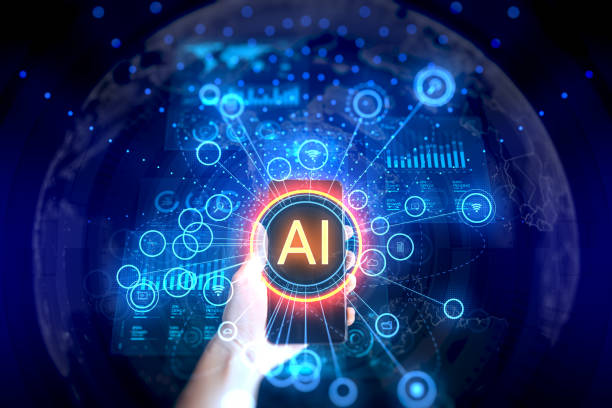What is Artificial Intelligence? Definition and Basic Concepts

What is Artificial Intelligence? Definition and Basic Concepts
#Artificial_Intelligence (AI) is, in short, the ability of a computer system to mimic human cognitive functions such as learning, reasoning, and problem-solving.
In fact, the goal of AI is to build machines that can do things that humans currently do better.
This field is rapidly advancing and has a significant impact on many aspects of our lives.
Artificial Intelligence is no longer a purely science fiction concept, but a tangible reality that exists around us.
Key concepts in artificial intelligence include:
- Machine Learning Algorithms that allow computers to learn from data without explicit programming.
- Deep Learning A subset of machine learning that uses artificial neural networks with multiple layers to analyze data.
- Natural Language Processing The ability of computers to understand and process human language.
- Computer Vision The ability of computers to “see” and interpret images.
- Robotics The design, construction, operation, and application of robots.
These concepts work together to enable AI systems to perform complex tasks, from facial recognition to driving a car.
Are you tired of losing customers due to poor website design for your online store? Solve this problem forever with Rasaweb!
✅ Increase sales and convert visitor-to-customer rates
✅ Smooth and attractive user experience for your customers⚡ Get free consultation
Types of Artificial Intelligence in terms of capabilities

Types of Artificial Intelligence in terms of capabilities
Artificial intelligence can be divided into several main categories based on capabilities:
- Narrow AI or Weak AI This type of AI is designed to perform a specific task and performs very well in that task.
Most AI systems we use today are of this type, such as voice assistants (Siri, Alexa) and recommendation systems. - General AI or Strong AI This type of AI has cognitive abilities similar to humans and can learn and perform any task that a human can do.
General AI has not yet been fully developed. - Super AI This type of AI surpasses human intelligence and can solve problems that are impossible for humans.
Super AI is a theoretical concept and does not yet exist.
The main difference between these types of AI is the level of generalizability and flexibility in solving problems.
Narrow AI is excellent in a specific field but cannot be generalized to other fields.
General AI can learn and reason in various fields, while Super AI goes beyond human intelligence.
Applications of Artificial Intelligence in various industries

Applications of Artificial Intelligence in various industries
Artificial intelligence is rapidly penetrating various industries and creating dramatic transformations.
Artificial intelligence in various fields including:
- Healthcare Disease diagnosis, drug development, robotic surgery, and medical record management.
- Finance Fraud detection, risk management, algorithmic trading, and customer service.
- Manufacturing Automation of production lines, quality control, and equipment failure prediction.
- Transportation Self-driving cars, route optimization, and traffic management.
- Retail Personalized recommendations, inventory management, and service robots.
- Education Intelligent educational systems, automated assessment, and personalized feedback.
Artificial intelligence helps companies increase their efficiency, reduce costs, and provide better products and services.
For example, in the healthcare sector, AI can help doctors diagnose diseases more accurately and quickly, which can lead to more effective treatments and save lives.
| Industry | Application |
|---|---|
| Healthcare | Disease Diagnosis |
| Finance | Fraud Detection |
| Manufacturing | Automation |
What are the advantages and disadvantages of artificial intelligence?

What are the advantages and disadvantages of artificial intelligence?
Artificial intelligence has numerous advantages and disadvantages that should be considered:
Advantages:
- Increased efficiency Automation of repetitive tasks and increasing the speed of doing things.
- Improved accuracy Reducing human errors and providing more accurate results.
- Cost reduction Automation and process optimization lead to cost reduction.
- 24/7 access AI systems can work around the clock and without interruption.
- Better decision-making Analysis of large data and providing valuable insights for decision-making.
Disadvantages:
- Implementation cost Implementing AI systems can be expensive.
- Need for expertise The development and maintenance of AI systems require expertise.
- Ethical concerns Issues related to privacy, discrimination, and accountability.
- Job loss Automation may lead to the loss of certain jobs.
- Data dependency The performance of AI depends on the quality and quantity of data.
By considering these advantages and disadvantages, better decisions can be made about the use of artificial intelligence in various fields.
It is important to pay attention to the ethical and social issues arising from artificial intelligence and strive to solve them.
Are you annoyed by losing customers due to the old appearance or low speed of your online store website? The expert Rasaweb team solves these problems by designing a professional online store website!
✅ Increase customer trust and brand credibility
✅ Amazing speed and excellent user experience
Get a free consultation with Rasaweb right now ⚡
The future of artificial intelligence and its impact on society

The future of artificial intelligence and its impact on society
The future of #artificial_intelligence is very bright and full of potential.
It is expected that artificial intelligence will penetrate our lives more widely in the coming years and have profound effects on society.
Recent advances in deep learning and natural language processing have made it possible to develop more complex AI systems.
In the future, artificial intelligence can help us solve major global issues such as climate change, poverty, and disease.
Some predictions about the future of artificial intelligence include:
- Expansion of automation More automation of tasks in various industries, including manufacturing, transportation, and services.
- Development of smart cities Using artificial intelligence to improve urban management, reduce traffic, and optimize energy consumption.
- Advances in healthcare Development of new drugs and treatments using AI, more accurate diagnosis of diseases, and provision of personalized care.
- Emergence of general AI Development of AI systems that can perform various tasks with a level of intelligence similar to humans.
- Increased human-machine interaction Using more natural and intuitive user interfaces for interacting with AI systems.
Of course, the advancement of artificial intelligence also comes with challenges.
It is important to pay attention to the ethical, social, and economic issues arising from artificial intelligence and strive to manage them.
Education and development of new skills are necessary to prepare for changes in the labor market.
Ethical and social challenges of artificial intelligence

Ethical and social challenges of artificial intelligence
The development and use of artificial intelligence creates numerous ethical and social challenges that require careful attention and review.
Some of these challenges include:
- Privacy The collection and use of personal data by AI systems can lead to a violation of individuals’ privacy.
- Discrimination AI algorithms may unintentionally be discriminatory and produce unfair results.
- Accountability In the event of an error or damage caused by an AI system, it is difficult to determine responsibility.
- Transparency The way AI algorithms work is often vague and difficult for non-experts to understand.
- Security AI systems may be vulnerable to cyber attacks and misused.
To address these challenges, it is necessary to enact appropriate laws and regulations and develop ethical standards for the development and use of artificial intelligence.
Also, education and awareness-raising to the community about issues related to artificial intelligence is necessary.
Cooperation between the government, industry, academia, and civil society can help solve these challenges.
How to learn artificial intelligence

How to learn artificial intelligence
Learning artificial intelligence can be a challenging but very rewarding process.
To get started, you can use various resources, including online courses, books, articles, and practical projects.
Artificial intelligence is a broad field, so it is important to start with the basic concepts and then gradually move on to more advanced topics.
Steps to learning artificial intelligence:
- Basic concepts Learning basic concepts of mathematics (linear algebra, calculus, statistics and probability) and programming (Python) is essential.
- Machine learning Start by learning machine learning algorithms (regression, classification, clustering) and related tools (Scikit-learn).
- Deep learning Learning artificial neural networks and deep learning tools (TensorFlow, PyTorch).
- Practical projects Doing practical projects to practice and consolidate concepts.
- Study and research Reading scientific articles and following the latest advances in the field of artificial intelligence.
Useful resources for learning artificial intelligence:
- Online courses Coursera, edX, Udacity, Khan Academy
- Books “Hands-On Machine Learning with Scikit-Learn, Keras & TensorFlow” by Aurélien Géron, “Deep Learning” by Ian Goodfellow, Yoshua Bengio, and Aaron Courville
- Websites and blogs Towards Data Science, Machine Learning Mastery, Analytics Vidhya
With effort and perseverance, you can acquire the skills needed to work in the field of artificial intelligence.
Important tools and libraries in artificial intelligence

Important tools and libraries in artificial intelligence
To develop artificial intelligence systems, there are various tools and libraries, each of which has its own features and applications.
Some of the most important of these tools and libraries include:
- Python A widely used programming language in artificial intelligence due to its simplicity and the existence of powerful libraries.
- TensorFlow An open-source library for machine learning and deep learning developed by Google.
- PyTorch Another open-source library for machine learning and deep learning developed by Facebook.
- Scikit-learn A library for machine learning that includes various algorithms such as regression, classification, and clustering.
- Keras A high-level user interface for building neural networks that can be used with TensorFlow and PyTorch.
- Numpy A library for numerical calculations in Python that is used for working with arrays and matrices.
- Pandas A library for data analysis in Python that is used for working with tabular data.
Choosing the right tool depends on the type of project and your specific needs.
By learning these tools and libraries, you can more effectively develop and implement artificial intelligence systems.
| Tool | Application |
|---|---|
| Python | Programming Language |
| TensorFlow | Deep Learning |
| Scikit-learn | Machine Learning |
Are you worried that your company’s old website will drive away new customers? Rasaweb solves this problem by designing a modern and efficient corporate website.
✅ Increases your brand credibility.
✅ Helps attract targeted customers.
⚡ Contact Rasaweb for a free consultation!
The impact of artificial intelligence on the labor market

The impact of artificial intelligence on the labor market
Artificial intelligence has a significant impact on the labor market.
On the one hand, automation can lead to job losses in some industries.
On the other hand, artificial intelligence creates new job opportunities in related fields.
Artificial intelligence provides new opportunities.
It is important that individuals and organizations prepare for these changes and acquire the necessary skills.
The impact of artificial intelligence on the labor market:
- Job loss Automation of repetitive and routine tasks can lead to job losses in some industries, such as manufacturing, transportation, and customer service.
- Job creation Artificial intelligence creates new job opportunities in related fields, such as AI developers, data scientists, machine learning engineers, and AI ethics specialists.
- Changing the nature of jobs Many jobs will change and require new skills such as critical thinking, problem-solving, and creativity.
- Increased productivity Artificial intelligence can help increase labor productivity and allow individuals to focus on more complex and creative tasks.
To prepare for labor market changes caused by artificial intelligence, individuals must learn new skills, and organizations must provide training and development programs for their employees.
Also, governments should develop policies to support the workforce and create new job opportunities.
Important tips for entering the field of artificial intelligence

Important tips for entering the field of artificial intelligence
Entering the field of artificial intelligence requires planning and effort.
Here are some important tips for those who want to enter this field:
- Education Learning the basic concepts of mathematics, programming, and machine learning is essential.
You can use online courses, books, and articles. - Expertise Choosing a specialized field in artificial intelligence (such as computer vision, natural language processing, or robotics) can help you focus your skills and become an expert in that field.
- Practical experience Doing practical projects to practice and consolidate concepts is very important.
You can participate in open-source projects or create your own personal projects. - Networking Communicating with other people in the field of artificial intelligence can help you learn, find a job, and develop professionally.
Attend related conferences and events and be active on social networks. - Staying up to date The field of artificial intelligence is rapidly advancing, so it is important to always stay up to date and follow the latest advances.
Read scientific articles and participate in training courses.
By following these tips, you can enter the field of artificial intelligence more effectively and succeed in it.
FAQ
| Question | Answer |
|---|---|
| What is artificial intelligence? | It is the simulation of human intelligence in machines that are programmed to think like humans and imitate their actions. |
| What are the main branches of artificial intelligence? | They include machine learning, deep learning, natural language processing, computer vision, and robotics. |
| What is Machine Learning? | It is a branch of artificial intelligence that focuses on enabling systems to learn from data and identify patterns without explicit programming. |
| Give examples of AI applications in our daily life. | Voice assistants (such as Siri and Alexa), recommendation systems in Netflix and Amazon, self-driving cars, and facial recognition programs. |
| What is Deep Learning? | It is a subset of machine learning that uses multilayered (deep) artificial neural networks to process large amounts of data. |
| What is Natural Language Processing (NLP)? | It is a branch of artificial intelligence that focuses on enabling computers to understand, interpret, and generate human language. |
| What are some ethical concerns related to artificial intelligence? | They include bias in data, privacy, job loss, and liability in case of errors. |
| What are the main benefits of artificial intelligence? | Increased efficiency, improved decision making, automation of repetitive tasks, and discovery of complex patterns in data. |
| How is artificial intelligence used in healthcare? | In diagnosing diseases, discovering drugs, analyzing medical images, and providing personalized care to patients. |
| How do you see the future of artificial intelligence? | It is expected to continue to evolve at a rapid pace, affecting all aspects of human life, from industry to education and entertainment. |
And other services of Rasa Web advertising agency in the field of advertising
Smart Reportage: A new service to increase sales through dedicated programming.
Smart Advertising Campaign: Professional optimization to increase website visits using user experience customization.
Smart Direct Marketing: Transform the click-through rate with the help of attractive user interface design.
Smart Brand Identity: A professional solution for analyzing customer behavior with a focus on marketing automation.
Smart Sales Automation: Transform campaign management with the help of Google Ads management.
And more than hundreds of other services in the field of internet advertising, advertising consulting, and organizational solutions
Internet Advertising | Advertising Strategy | Advertorial
Resources
What is artificial intelligence and how does it work?
,Definition of artificial intelligence in Techopedia
,Artificial intelligence at IBM
,Artificial intelligence – Senate Intelligence Committee
? Are you ready to transform your business in the digital world? Rasaweb Digital Marketing Agency, specializing in providing comprehensive digital solutions, from corporate website design to SEO optimization and social media management, is ready to help you grow and achieve your goals. With us, have a powerful and effective presence online.
📍 Tehran, Mirdamad Street, next to the Central Bank, South Kazerun Alley, Ramin Alley No. 6



